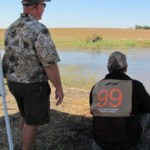
The penalty for using the F-word when growing up was worse than having to wash one’s mouth out with soap. It usually meant getting grounded for some period of time and that meant no fishing expeditions to local ponds and rivers. These trips were executed on bicycles outfitted with rod holders and tackle box containers. In those days, most did not get cars until well past the driver license age. Losing fishing privileges was a big penalty.
Today’s F-word and fisheries are far different. Some think that not believing in the F-word as it applies to fisheries should get a punishment far worse than oral soap or getting grounded. They think that if one is not for the F-word, then one is against recreational fishing and the industry it supports.
What is today’s F-word? Well, it is “flexibility” and seems to be the central concept being pushed for the current Re-authorization of the Magnusson Stevens Act (MSA), also know as the Sustainable Fisheries Act (SFA), so named after its re-authorization in 2006. I am hoping that this reauthorization does not become the “Flexible Fisheries Act.”
What’s the problem with making fisheries more flexible to help accommodate the needs of the resource users. Nothing really. But do we need to make a change to do that? A lot of folks do not think so.
Last week, one of my fellow bloggers, Capt. John McMurray, wrote a good piece on the current efforts to Re-authorize the MSA/SFA, whichever you’d like to call it. He gave a good look at all the major issues. If you want a refresher give it a read. I am going to focus in on one issue that continues to give me heartburn. This issue is also getting some traction after a recent report was released by the National Research Council, which is an arm of the US National Academy of Sciences. Several former members of Congress requested the report. I cannot criticize the report as I have felt that the arbitrary re-building timeline mandated in MSA was just that. Arbitrary. But the mandated timeline does hold managers feet to the fire as well as tying their hands on some species.
The report does say that the existing law works. It noted that a good percentage of the stocks examined were now rebuilt or rebuilding. This is all good news. What the report points out is that current science capability is not good enough to precisely manage to a specified biomass level. Given that constraining element, they suggested that managing to a mortality level rather than an arbitrary timeline “might” be a better way to go. Note they said “might” not “would be.” From a managers standpoint, managing to a mortality level is very attractive because it is fairly straight forward. Set it and forget it!
In a discussion with John Pappalardo, CEO of the Cape Cod Commercial Fisherman’s Alliance, he made a very good observation about this report. “This report is an intellectual debate that will unfortunately be used to inform a policy decision.” Spot on.
With some of the problematic stocks, the allowed mortality (landings + discards + natural mortality) would be set at a low level with no rebuilding timeline. That may work for the commercial industry as it avoids the huge swings in quota currently being experienced and gives some level of stability. I doubt that it will be much help to the struggling groundfish industry in New England.
However, my strong sense is that this type of management strategy will absolutely cream the recreational users that share resources with the commercial users. What drives the recreational industry? Fishing trips. What drives fishing trips? Abundance of fish. This has been proven time and again. People want to catch fish and since recreational users have the least efficient gear, they need lots of fish. Keeping them at low levels until the stars align to cause a lot of high recruitment events will not help the recreational industry. I think that a lot of the push from the recreational industry for the F-word is due to one or two specific fisheries. Ya, ya, red snapper is one. There may be other ways to address these specific fisheries and it appears that the Gulf is working on one.
I do not think that there needs to be a complete remake of MSA to solve some specific issues. Rick Methot, Chief assessment Scientist for NOAA Fisheries supported that idea, “the agency is investigating how it can revise its national management guidelines to provide more flexibility, while still preventing overfishing and rebuilding fish stocks. We are interested in finding the right balance of flexibility and firmness.”
If there are ways to improve MSA that make the managers jobs simpler and more effective, I am all for it. However, allowing stocks to remain at low levels for prolonged periods will do nothing to rebuild and sustain the recreational fishing industry. I’m pretty sure of that.













